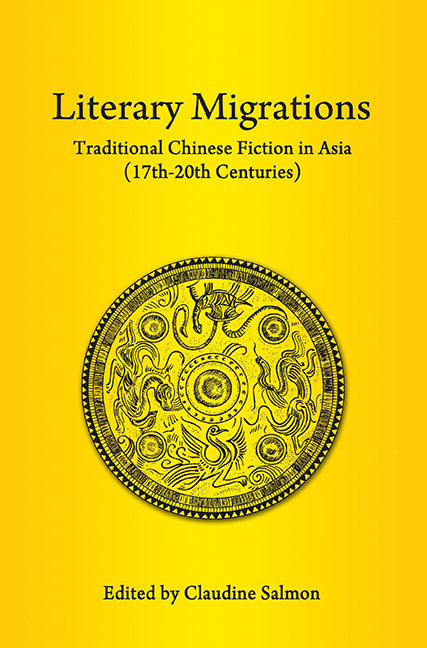Book contents
- Frontmatter
- Contents
- FOREWORD
- Dr Salmon as I Know her
- Preface to Reprint Edition
- Acknowledgements
- INTRODUCTION
- PART I KOREA AND JAPAN
- PART II MAINLAND NORTHEAST ASIA
- PART III MAINLAND SOUTHEAST ASIA
- PART IV INSULAR SOUTHEAST ASIA
- 10 A Note on Javanese Works Derived from Chinese Fiction
- 11 Malay Translations of Chinese Fiction in Indonesia
- 12 Writings in Romanized Malay by the Chinese of Malaya — A Preliminary Inquiry
- 13 Lie Sie Bin Yoe Tee Hoe — Six Malay/Indonesian Translations of a Chinese Tale
- 14 Liang Shanbo yu Zhu Yingtai — A Chinese Folk Romance in Java and Bali
- 15 Translations of Chinese Fiction into Makassarese
- 16 Sam Pek Eng Tay — A Chinese Love Story in Madurese
- 17 Post-war Kung Fu Novels in Indonesia — A Preliminary Survey
- Bibliography
- Author, story-teller and translator index
- Title index
- List of Plates
- Contributors
- Plate section
13 - Lie Sie Bin Yoe Tee Hoe — Six Malay/Indonesian Translations of a Chinese Tale
from PART IV - INSULAR SOUTHEAST ASIA
Published online by Cambridge University Press: 21 October 2015
- Frontmatter
- Contents
- FOREWORD
- Dr Salmon as I Know her
- Preface to Reprint Edition
- Acknowledgements
- INTRODUCTION
- PART I KOREA AND JAPAN
- PART II MAINLAND NORTHEAST ASIA
- PART III MAINLAND SOUTHEAST ASIA
- PART IV INSULAR SOUTHEAST ASIA
- 10 A Note on Javanese Works Derived from Chinese Fiction
- 11 Malay Translations of Chinese Fiction in Indonesia
- 12 Writings in Romanized Malay by the Chinese of Malaya — A Preliminary Inquiry
- 13 Lie Sie Bin Yoe Tee Hoe — Six Malay/Indonesian Translations of a Chinese Tale
- 14 Liang Shanbo yu Zhu Yingtai — A Chinese Folk Romance in Java and Bali
- 15 Translations of Chinese Fiction into Makassarese
- 16 Sam Pek Eng Tay — A Chinese Love Story in Madurese
- 17 Post-war Kung Fu Novels in Indonesia — A Preliminary Survey
- Bibliography
- Author, story-teller and translator index
- Title index
- List of Plates
- Contributors
- Plate section
Summary
Indonesian translations from Chinese sources appears to have been growing, judging from the increasing number of references to such texts, and the publication in 1981 of Claudine Salmon's voluminous catalogue (Literature in Malay by the Chinese of Indonesia (Paris: Editions de la Maison des Sciences de l'Homme, 1981)) has provided researchers with an invaluable guide in this area. Much of the attention devoted to this genre of printed Malay books has focused either on their role in stimulating the development of a popular, romanized Malay literature in late nineteenth century Indonesia, or on their value as sociological “evidence” of the thinking of the Indonesian Chinese community in this period. Insofar as the texts themselves are concerned, the method of analysis has been a thematic one, with the underlying assumption that from a literary point of view, the translations do not differ significantly from their original Chinese texts. The question naturally arises as to whether a thematic analysis will tell us very much about Malay literature and Indonesian Chinese society if the literature is purely Chinese. In this study therefore we have attempted to examine more carefully the relationship between the Malay translations and their Chinese sources.
1. The Six Translations and the Problems They Present
Faced with such a thicket of relatively unexplored literature (Salmon lists 759 titles, not counting reprints, for translations from Chinese works), we have been drawn to investigate six translations into Malay/Indonesian of a short tale from the Chinese novel Xiyou ji (“Record of a Westward Journey”), a work which has enjoyed an immense popularity in China for several centuries. The tale, which comprises three chapters of the 100-chapter Chinese novel, relates the purported journey into Hades of the Tang emperor Taizong (Li Shimin) to answer charges before the underworld tribunal in the case of a slain dragon king.
A Malay translation of the entire 100-chapter Xiyou ji appears to have been completed only once in Indonesia (See Ijoe, Yap Goan Ho, Batavia and Semarang, 1895–96, 24 vols, 1924 p.) although this massive work was later reprinted in its entirety (Kho Tjeng Bie & Co, Batavia, 1919, 24 vols, 1886 p.). The passages containing the tale of Taizong's journey to the underworld were then excerpted directly from this text and published as an 82-page booklet in 1920 (text B below).
- Type
- Chapter
- Information
- Literary MigrationsTraditional Chinese Fiction in Asia (17th–20th Centuries), pp. 315 - 335Publisher: ISEAS–Yusof Ishak InstitutePrint publication year: 2013

